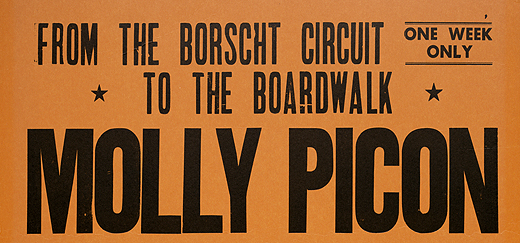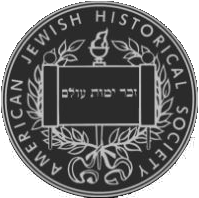Throughout their more than 50 years together Molly Picon, the “Darling of the Yiddish theater” and her husband and collaborator Yonkel (Jacob) Kalish kept scrapbooks brimming with clippings, reviews and interviews, fan letters, programs, telegrams and other ephemera. Spanning the years 1919 to 1967, primarily in Yiddish and English, the scrapbooks reveal Molly’s best self: Her love of Yiddish theater and her audience, her tireless work ethic, and her longevity as a performer. Molly’s scrapbooks chronicle her prolific career in lived time and as she and Yonkel wanted to remember it. This exhibition provides a glimpse beyond Molly Picon’s international career and into the Yiddishkeit of her abundant life.
“Pages from a Performing Life” draws on the Molly Picon Papers, which include 22 scrapbooks, at the American Jewish Historical Society as well as material from the collections of the YIVO Institute, a fellow partner at the Center for Jewish History.
Exhibit curated by Ari Y. Kelman, Assistant Professor of American Studies, University of California, Davis.
Scrapbooks from the Molly Picon Papers can be accessed at http://digital.cjh.org
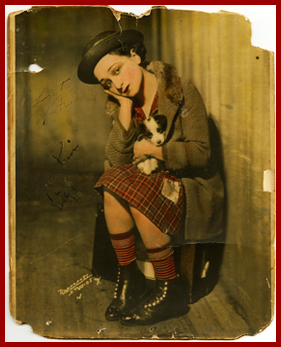
An All-American Girl Learns Yiddish 1898-1923
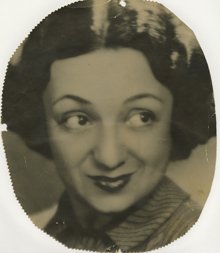
Molly was born Margaret Pyekoon to Clara Ostrovsky and Louis Pyekoon on the Lower East Side on either February 28, or June 1. In typical Molly fashion, she celebrated both birthdays. At age 5, Molly made her stage debut, winning a local talent competition. Feeling pressure to support her single mother, Molly left school as a teenager to join an English-language vaudeville troupe. Life changed dramatically in 1918, when she met Yonkel (Jacob) Kalich, who would become her husband, manager and creator of many of her roles on the Yiddish stage.
“When we met in Boston, I was the All-American Girl full of hurdy-gurdys and absolutely illiterate about Jewish culture. Yonkel, on the other hand, was the complete intellectual who knew not only classic Yiddish but its plays, theater and writers.”
Shortly after they married in 1919, Yonkel and Molly toured the “Jewish” cities of Eastern Europe so that she could improve her Yiddish and gain performing experience.
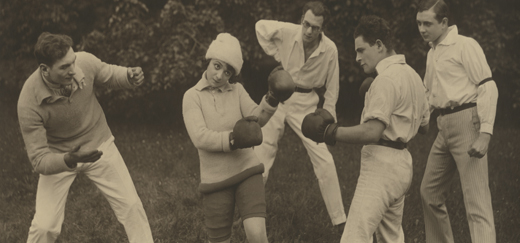
Molly in the film East and West (Mezrach und Maarev), Vienna 1923
The Darling of Second Avenue: 1923-1930
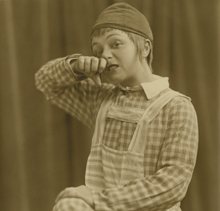
Yonkel (objecting to a local promoter): “I didn’t shlep Molly all over Europe for two years to come back to America to play in Baltimore!”
On their return to New York, Yonkel kept writing songs and shows to highlight Molly’s skills. Molly sold out night after night, quickly becoming a sensation on Second Avenue and beyond. Between 1925 and 1929, she opened eight new plays and took them on tour, performing for Jewish theater audiences from coast to coast. Molly’s scrapbooks testify to her incessant schedule and the outpouring of rave reviews.
In 1929, Broadway called and Molly made her first appearance “uptown” at the Palace with Sophie Tucker in a vaudeville-style revue. Tucker played in Yiddish and Molly performed her own material translated into English. As a performer, Molly relished her success in front of a new and often critical audience.
“From Christmas 1923 to 1925 we were working … in a number of plays – Yonkele, Tzipke, Shmendrick, Gypsy Girl, Molly Dolly and The Little Devil. Then, in 1926, we went on to do … very good business – Mamale, Raizele, Oy Is Dus a Madel, followed by The Circus Girl.”
Humor writer and comic artist Harry Hirshfield reviews Molly in the Little Czar, Scrapbook 1923-31.
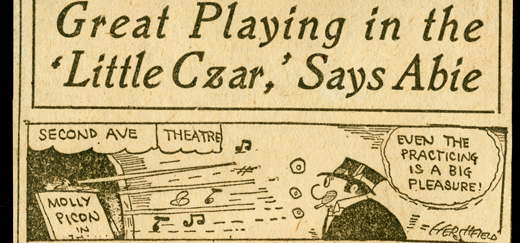
Molly Takes Latin America: 1930-36
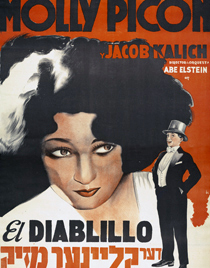
“We also played Paris and the London Palladium, but our most intriguing success in 1932 had to be our six-month engagement in South America. It’s some neat trick finding a packed Yiddish house in Buenos Aires.”
Supported by an Argentinean benefactor, Molly played Latin America in the early 1930s, including 138 sold-out shows in Buenos Aires. By the time they packed up to return home, Molly had become “an institution in that city, having dresses, hats and even a restaurant named after her.”
Molly returned to the United States to play Chicago and Washington, only to leave soon after to play Europe again and then for Hebrew-speaking Jews in Palestine for the first time – where she played in Yiddish. Though out of political fashion, her audience of kibbutzniks loved it.
“We continued driving straight through the Blue Ridge Mountains of Virginia, the Smokies, and south until we got to San Antonio. For four days we’d be driving and not one deli on the whole trip!”
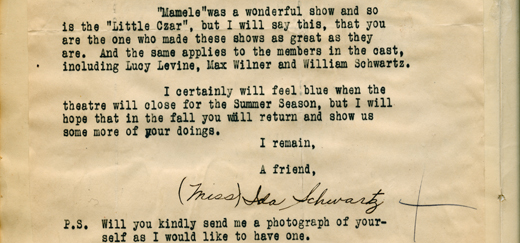
Molly collected letters from her adoring fans in a dedicated scrapbook, 1921-27
On the Silver Screen: 1936-38
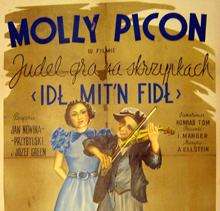
Molly began these years on radio as the host of the Maxwell House Coffee Program on WHN, before returning to Broadway to appear again with Sophie Tucker. In 1936, Molly and Yonkel returned to Poland so Molly could star in Yidl Mitn Fidl, one of the most successful Yiddish talkies. The film featured Molly as a fiddle-playing girl who dresses like a boy in order to continue playing with her impoverished father’s band. Before returning home to New York, Molly played a concert in Warsaw, where Yonkel’s mother was in the audience.
“The wedding scene in Yiddel took over thirty consecutive hours to film. The food had to be truly kosher, because we hired the Orthodox Jewish men, women and children of Kazimierz to be the guests. As we filmed, they ate, and for the successive shots of the table, the food had to be replenished, over and over again. Our poverty-stricken guests couldn’t figure out what was happening. They thought they had been invited to a real wedding.”
After a brief spell at home when Molly opened two new shows, Molly and Yonkel returned to Poland so she could star in another film, Mamele. It was to be the last Yiddish film made in Poland before the Nazi onslaught. Molly played a girl whose mother dies and leaves her to care for an unpredictable family living in the shtetl. As the film wrapped, Molly felt the increasing pressure of anti-Semitism, and cut a scheduled tour short to return to America.
Molly performing on radio, on the Maxwell House Coffee Program, 1938
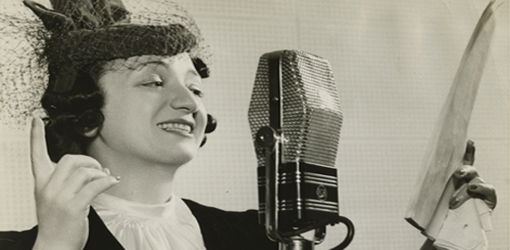
The Late 1930's: Global Molly, Local Molly
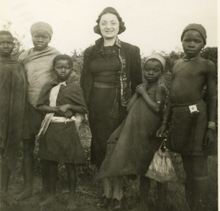
“This time we were headed for Africa – one of the few places left on the globe we hadn’t played in.”
Molly’s scrapbooks and letters show her hard at work, playing England and South Africa, as she and Yonkel continued their frantic travel and performance schedule, covering more than 50,000 miles, mostly by boat. Once home, her schedule remained as busy as ever: performing on radio. But Molly had grown tired of the Shmendricks and Yonkeles she had been playing for almost 20 years. Looking for something different, Molly jumped at the chance to play in English on Broadway, accepting a role as a “sophisticated New York Jewish woman” in Morning Star.
“I entered rehearsals for Morning Star eager to succeed in this new phase of my career – but I was a little uneasy as to just how to go about it. My anchor was the Yiddish stage. I had performed in its comedy melodrama, and helped write many of its songs; I knew thoroughly how to entertain its audiences. Uptown, however, I felt a bit adrift.”
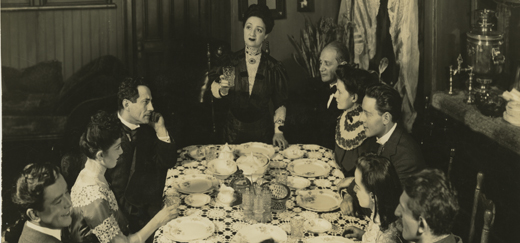
“Molly (standing) on Broadway in Morning Star, 1940
Molly and the War Effort
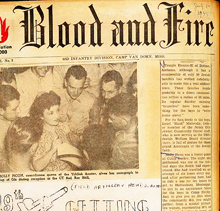
With the war very much on their minds and moved by the plight of children orphaned by the war, Molly and Yonkel adopted George Weinstein, the first of four foster children they would welcome into their family. Cut off from Eastern Europe, she and Yonkel toured the United States and Molly made her debut in Hollywood. She also signed on to work with the USO, visiting American army bases and tirelessly entertaining the troops.
“[When the war ended] Yonkel and I immediately applied to the Jewish Labor Committee for the chance to go to Europe. As we awaited the proper visas from Belgium, Poland, Sweden and other countries, Yonkel and I had the whole family making packages to take overseas.”
In 1946, Molly and Yonkel played for survivors and displaced persons in Paris, Warsaw, Lodz, and many places in between. Following the war, they remained committed to public service and dedicated a tremendous amount of time and energy to entertaining troops during the Korean War and to selling bonds for the new State of Israel.
“While there was very little I could do to turn Korea’s dismal situation around, I rededicated myself to piling up bucks for Israel, the more the better.”
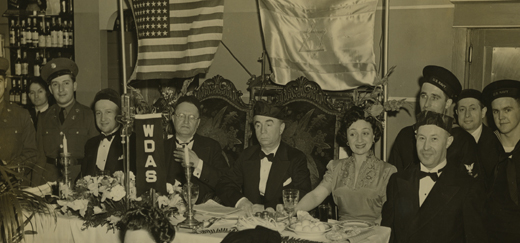
Off Second Avenue, On Broadway: 1950-1970
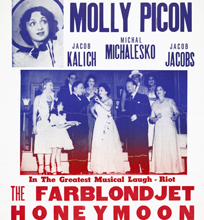
With Jewish life on the Lower East Side slowly disappearing, and Broadway in a slump, Molly and Yonkel continued their work on the “bonds belt.” To Molly’s great delight, Yonkel scored a role in the television adaptation of Leo Rosten’s The Education of H*Y*M*A*N K*A*P*L*A*N.
After a tour of Israel and two more Kalich plays, The Farblonjet Honeymoon and The Kosher Widow, Molly replaced Gertrude Berg as the lead in Majority of One, which she opened in London to rave reviews.
Molly followed her success with a lead role in Jerry Herman’s first Broadway musical, called Milk and Honey, which earned her first Tony Award nomination. Shortly thereafter, she played Frank Sinatra’s Italian mother in Come Blow Your Horn, for which she received an Oscar nomination in 1962.
In 1971, her iconic status solidified, Molly took the role of Yente the Matchmaker in Norman Jewison’s film version of Fiddler on the Roof. Perhaps the only thing that made her prouder than her own contribution was Yonkel’s turn as Anatevka’s melamed (teacher).
“By our tenth week in Zagreb [during the filming of Fiddler], the biggest news was that I had made the Times crossword puzzle.”
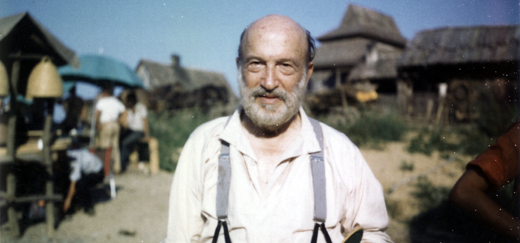
Jacob (Yonkel)Kalich on the set of Fiddler on the Roof, Yugoslavia, 1970
Molly's Legacy
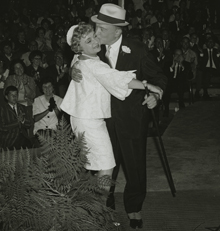
“I realize that Yiddish audiences are the most appreciative and the most ready in the display of approval. I could not bear to play for a cool, calm audience that was politely attentive. To me the Jewish atmosphere is warming and inspiring. The joy which the audience does not hesitate to display enheartens me, and is far more satisfactory than the perfunctory applause which follows even the greatest successes in the American theater.” Molly Picon in The Jewish Tribune. June 4, 1926
After Yonkel’s death in 1975, Molly found solace on the stage. She continued working a rigorous schedule, appearing in her own one-woman show, “Hello Molly” well into her eighties, before succumbing to Alzheimer’s disease in 1992 at the age of 94.
While adoring audiences could see her anywhere for one night, her scrapbooks offer a long view of her career and a glimpse into Molly’s love for Yonkel, for Yiddish, for the stage, for her audiences, and for Jewish people worldwide.
These fragile scrapbooks illustrate two lives that were neither nostalgic nor stiff, within the context of social and cultural history. In careers that spanned the 20th century and saw the decline of Yiddish as a spoken language, Yonkel’s writing and Molly’s persona lit up stages around the globe, leaving a legacy of Yiddish performance more vivid and enduring than these pages can tell.
Scrapbooks from the Molly Picon Papers can be accessed at http://digital.cjh.org
Taken from a 1956 poster.
